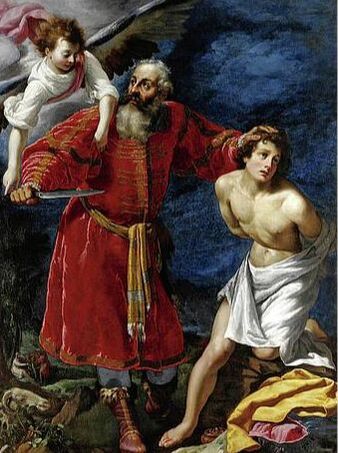1 Peter 3:1-12 Lesson 449
Read both the "King James Bible" and the "New Living Translation."
Simon Peter
In this lesson:
A continuation of lesson 448.
The good wife (3:1-6).
The good husband (3:7).
Harmony (3:8-12).
A continuation of lesson 448.
The good wife (3:1-6).
The good husband (3:7).
Harmony (3:8-12).
The sacrifice of Isaac.
By Italian artist Matteo Rosselli (1578-1650).
By Italian artist Matteo Rosselli (1578-1650).
Who was -
Sara -
Means princess, Sara was also called Sarah or Sarai (Genesis 17:15). She was Abraham's half-sister (Genesis 20:12) and wife. She was a woman of great faith (Hebrews 11:11) and is called the mother of Israel (Genesis 17:15-19). Sara could not bear children, so she suggested to Abraham that their servant, Hagar, bear his child (Genesis 16:1-3). This was a common practice (Genesis 30:3-5). After Hagar delivered Abraham a son (Ishmael), Sara, with God's intervention, became pregnant at the age of ninety (Genesis 17:17)) and bore Abraham a second son (Isaac). In time, Sara feared that Hagar and her son Ishmael were rivals to her and Isaac and had Abraham banish them (Genesis 21:9-10). Sara died at one hundred and twenty-seven (Genesis 23:1-2) and was buried alongside Abraham in a cave at Machpelah (Genesis 25:7-10). You can read more about Abraham and Sara in Genesis 11-25.
Abraham -
Abraham is the founder of Judaism, the father of all Jews (Romans 4:11-16; Galatians 3:7), the spiritual forefather of Christians (Galatians 3:29), a man of faith (Galatians 3:9; Hebrews 11:8-9), and a "friend" of God (2 Chronicles 20:7; Isaiah 41:8; James 2:23). Abraham was also called the "Father of a multitude," "exalted Father," and Abram (Genesis 15:1; 17:4-5). Born in Ur (present-day Iraq), Abraham is perhaps the greatest of the Old Testament personalities. His story is part of almost every Eastern religion, including Islam, where he is called the father of all Arab peoples through his son Ishmael. Abraham, a man of tremendous faith, left his home and family for a strange country simply because God asked him to (Genesis 12:1; Acts 7:2-4). Later, God asked Abraham to go to "the land of Moriah" and sacrifice his son Isaac to test his faith (Genesis 22:1-2). Despite misgivings, Abraham felt God knew best and trusted Him (Genesis 15:6). He believed God would resurrect Isaac (Hebrews 11:19) and set off for Mount Moriah, * a hill near Jerusalem, to sacrifice Isaac
(Genesis 22:1-10; Hebrews 11:17). When Abraham proved his faith by preparing to knife his son, an angel intervened and saved Isaac (Genesis 22:11-13). Because of his unwavering faith, God promised Abraham that his descendants (the Israelites) would be a great and populous people (Genesis 17:2-7; 22:16-18; 26:4; 24) and to bless all Gentiles through him (Genesis 12:2-3; 15:1-21; 18:18; 22:18; 28:14; Exodus 32:13). God's promise is called the Abrahamic Covenant (agreement). Abraham's deeds sometimes disappointed God, but he never lost his righteousness because it is never deeds that earn righteousness; it is faith (Genesis 15:6). Abraham died at 175 (Genesis 25:7) and was buried alongside his wife Sara in a cave of Machpelah (Genesis 23:9; 25:7-10) on the western slope of Mt. Hebron. Centuries later, a Christian church was built over the cave. Later, the church was converted into an Islamic Mosque. Jesus' roots date back to Abraham (Matthew 1:1-16), proving that the Messiah's lineage goes back to the beginning of the Jewish nation.
You can read more about Abraham in Genesis 11:26-25:34.
* Some Bible scholars believe Mount Moriah is the same hill Jesus was crucified on centuries later. However, most Jews believe the Temple's sacrificial altar in Jerusalem was built over the site where Abraham prepared to sacrifice his son.
Sara -
Means princess, Sara was also called Sarah or Sarai (Genesis 17:15). She was Abraham's half-sister (Genesis 20:12) and wife. She was a woman of great faith (Hebrews 11:11) and is called the mother of Israel (Genesis 17:15-19). Sara could not bear children, so she suggested to Abraham that their servant, Hagar, bear his child (Genesis 16:1-3). This was a common practice (Genesis 30:3-5). After Hagar delivered Abraham a son (Ishmael), Sara, with God's intervention, became pregnant at the age of ninety (Genesis 17:17)) and bore Abraham a second son (Isaac). In time, Sara feared that Hagar and her son Ishmael were rivals to her and Isaac and had Abraham banish them (Genesis 21:9-10). Sara died at one hundred and twenty-seven (Genesis 23:1-2) and was buried alongside Abraham in a cave at Machpelah (Genesis 25:7-10). You can read more about Abraham and Sara in Genesis 11-25.
Abraham -
Abraham is the founder of Judaism, the father of all Jews (Romans 4:11-16; Galatians 3:7), the spiritual forefather of Christians (Galatians 3:29), a man of faith (Galatians 3:9; Hebrews 11:8-9), and a "friend" of God (2 Chronicles 20:7; Isaiah 41:8; James 2:23). Abraham was also called the "Father of a multitude," "exalted Father," and Abram (Genesis 15:1; 17:4-5). Born in Ur (present-day Iraq), Abraham is perhaps the greatest of the Old Testament personalities. His story is part of almost every Eastern religion, including Islam, where he is called the father of all Arab peoples through his son Ishmael. Abraham, a man of tremendous faith, left his home and family for a strange country simply because God asked him to (Genesis 12:1; Acts 7:2-4). Later, God asked Abraham to go to "the land of Moriah" and sacrifice his son Isaac to test his faith (Genesis 22:1-2). Despite misgivings, Abraham felt God knew best and trusted Him (Genesis 15:6). He believed God would resurrect Isaac (Hebrews 11:19) and set off for Mount Moriah, * a hill near Jerusalem, to sacrifice Isaac
(Genesis 22:1-10; Hebrews 11:17). When Abraham proved his faith by preparing to knife his son, an angel intervened and saved Isaac (Genesis 22:11-13). Because of his unwavering faith, God promised Abraham that his descendants (the Israelites) would be a great and populous people (Genesis 17:2-7; 22:16-18; 26:4; 24) and to bless all Gentiles through him (Genesis 12:2-3; 15:1-21; 18:18; 22:18; 28:14; Exodus 32:13). God's promise is called the Abrahamic Covenant (agreement). Abraham's deeds sometimes disappointed God, but he never lost his righteousness because it is never deeds that earn righteousness; it is faith (Genesis 15:6). Abraham died at 175 (Genesis 25:7) and was buried alongside his wife Sara in a cave of Machpelah (Genesis 23:9; 25:7-10) on the western slope of Mt. Hebron. Centuries later, a Christian church was built over the cave. Later, the church was converted into an Islamic Mosque. Jesus' roots date back to Abraham (Matthew 1:1-16), proving that the Messiah's lineage goes back to the beginning of the Jewish nation.
You can read more about Abraham in Genesis 11:26-25:34.
* Some Bible scholars believe Mount Moriah is the same hill Jesus was crucified on centuries later. However, most Jews believe the Temple's sacrificial altar in Jerusalem was built over the site where Abraham prepared to sacrifice his son.
Study Tip:
"Write down what you learn.
Don't forget the things the Bible has to teach you!
Use a journal or notebook to keep track of the insights you pick up as you study."
British writer, literary scholar, and theologian C. S. Lewis (1898-1963)
"Write down what you learn.
Don't forget the things the Bible has to teach you!
Use a journal or notebook to keep track of the insights you pick up as you study."
British writer, literary scholar, and theologian C. S. Lewis (1898-1963)












